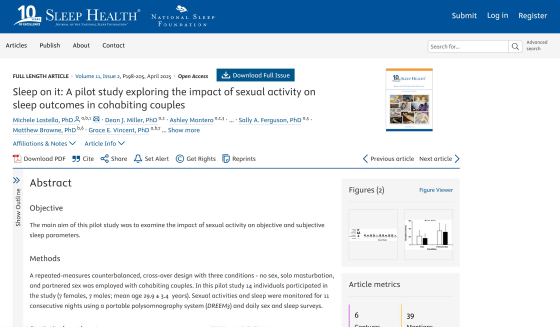Sex and masturbation before bedtime improve objective sleep quality

You may have heard the theory that sex or masturbation helps you sleep better, but most existing studies looking at orgasm and sleep rely on subjective reporting, so a team of Australian researchers set out to objectively measure the effects of sex and masturbation on sleep quality.
Sleep on it: A pilot study exploring the impact of sexual activity on sleep outcomes in cohabiting couples - Sleep Health: Journal of the National Sleep Foundation

Sexual activity before bed improves objective sleep quality, study finds
https://www.psypost.org/sexual-activity-before-bed-improves-objective-sleep-quality-study-finds/
'I get asked a lot of questions about sleep all the time,' says Dr Michelle Lastella , a sleep researcher at Central Queensland University in Australia. 'One common question is, 'Why does my partner fall asleep straight away after sex but I can't?' I think the reason I get asked this so often is because there's a real lack of research evidence.'
The most common question La Stella hears about on this topic is, 'Men fall asleep quickly after sex, but women have a hard time falling asleep.' From this, La Stella speculated that whether or not a woman orgasms during sex may be related to how well she sleeps afterwards.
Lastella and her team studied seven sexually active heterosexual couples living together in South Australia. The 14 participants in total had no disorders that could affect their sleep habits, and the women were not pregnant or had children. The average age of the participants was about 26 years old, and all couples had sex at least once a week.

The study followed participants for a total of 11 days. Each of the 11 days was assigned to one of three nights: a night without sex or masturbation, a night with solo masturbation, or a night with partner sex. Each night participants either masturbated or had sex alone just before going to bed, and wore a headband-type
When the data was analyzed, it was found that on nights when they had engaged in some kind of sexual activity, participants went to bed later than on nights when they had not engaged in any sexual activity, but they also found that they spent significantly less time awake after falling asleep and their sleep efficiency was higher, meaning that they spent more of the time they were in bed actually asleep.
The sleep efficiency , which indicates the amount of time spent in bed actually asleep, was 93.2% on nights when men masturbated alone, 93.4% on nights when they had sex with their partner, and 91.5% on nights when they did not have sex. In addition, nighttime wakefulness was reduced by about 7 minutes on nights when they had sex.
Interestingly, the improvement in sleep following sexual activity was only evident in the objective data. Subjects' subjective assessment of sleep quality was not significantly different between days when they had sex before bedtime and days when they didn't. Subjects also reported feeling more motivated and ready to start the day the day after having sex with their partner.
'We observed that sexual activity, whether through solo masturbation or partnered sex, reduced the time spent awake during the night, improved overall sleep efficiency, and improved objective sleep quality,' La Stella told PsyPost. 'There was no difference in duration of sleep, time it took to fall asleep, or subjective measures of sleep.'

The research team believes that this result may be due to hormonal changes that occur after orgasm, which is known to increase the production of hormones such as oxytocin and prolactin and decrease levels of the stress hormone cortisol .
Oxytocin, also known as the 'happiness hormone,' is associated with stress reduction and improved sleep quality, while prolactin is associated with sexual satisfaction and relaxation. It is possible that changes in the secretion of these hormones suppress arousal and promote a smooth transition to restful sleep.
The study's sample size was small, at 14 people, and the subjects were limited to young, healthy heterosexuals. In addition, the subjects had to wear a monitoring headband after sexual intercourse, which differed from a real-life scenario. Therefore, La Stella and his colleagues are seeking funding to conduct a larger, more diverse study.
Related Posts:
in Science, Posted by log1h_ik







